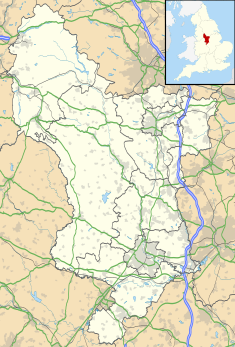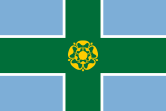Eyam Hall
 From Wikipedia the free encyclopedia
From Wikipedia the free encyclopedia
| Eyam Hall | |
|---|---|
 Eyam Hall in 2017 | |
| OS grid reference | SK2165576485 |
| Built for | John and Elizabeth Wright |
Listed Building – Grade II* | |
| Official name | Eyam Hall |
| Designated | 29 September 1951 |
| Reference no. | 1334913[1] |
Eyam Hall is a country house within the civil parish of Eyam, Derbyshire, located to the west of St Lawrence's Church, Eyam. It is recorded in the National Heritage List for England as a Grade II* listed building.[1]
Eyam Hall was leased to the National Trust from 2013 until 2018.[2]
History
[edit]The Wright family were landowners in Eyam although their family was historically based in Longstone.[3] William Wright gave his land in Eyam to his second son Thomas who is credited with building the hall.[citation needed] Thomas's son John sold his father's house in Unthank and based his branch of the family in Eyam.[4] The hall began life as a generous wedding present in 1671 for John Wright and his new wife Elizabeth.[citation needed] It has been in the Wright family for nine generations and is currently a family home and wedding venue that opens at different times of the year.[citation needed] The historic house is situated in picturesque part of Derbyshire and is an unspoilt example of a gritstone Jacobean manor house.[1] The National Trust leased the hall for 5 years in March 2013, however, their lease has now ended and the Hall is back in the hands of the family full-time.[5]
General information
[edit]The Hall and garden are open at different times each year.[6] There is a craft centre and restaurant adjacent to the hall. The shops and cafe are open all year round (except January) from 10 to 4.30 p.m. Eyam Hall is a Grade II* listed building.[1]
See also
[edit]- Grade II* listed buildings in Derbyshire Dales
- Listed buildings in Eyam
- List of places in Derbyshire
References
[edit]- ^ a b c d Historic England. "Eyam Hall (Grade II*) (1334913)". National Heritage List for England. Retrieved 6 April 2015.
- ^ "Historic Houses Foundation | Eyam Hall". HistoricHousesFound. Retrieved 13 August 2023.
- ^ Wood, William (1859). The history and antiquities of Eyam: with a minute account of the Great Plague, which desolated that village in the year 1666. London: Bell and Daldy. p. 183.
- ^ "Wright of Eyam Hall". Administrative history. National Archives. Retrieved 22 April 2013.
- ^ "Eyam Hall and Craft Centre". National Trust. Archived from the original on 6 April 2014. Retrieved 2 August 2023.
- ^ "House Opening". Eyam Hall. Retrieved 19 October 2018.
External links
[edit]- Official website

- Eyam Hall & Craft Centre - National Trust

